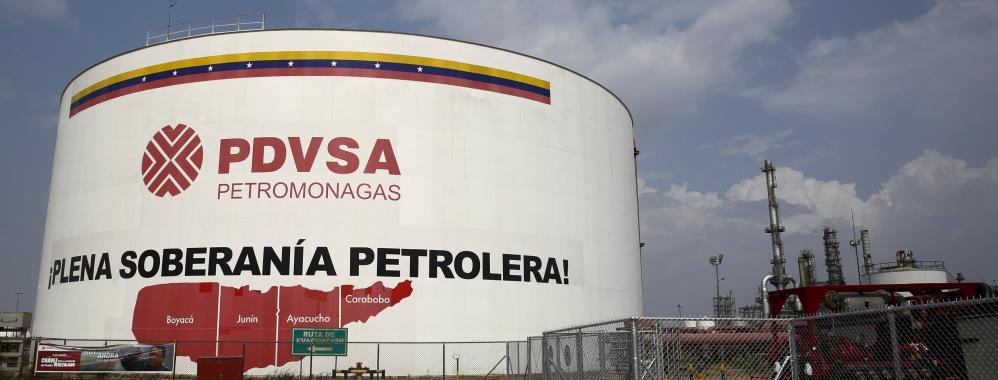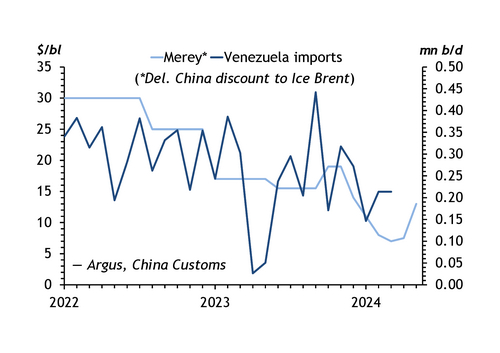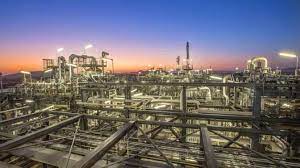
(Argus, 17.Apr.2024) — The US administration today reimposed sanctions targeting Venezuela’s oil exports and energy sector investments and set a deadline of 31 May for most foreign companies to wind down business with state-owned PdV.
The US decision rescinds a sanctions waiver issued last October, which allowed Venezuela to sell oil freely to any buyer and to invite foreign investment in the country’s energy sector. The waiver, which was due to expire on 18 April, was tied to Caracas’ agreement to hold a competitive presidential election and to allow opposition politicians to contest it.
Venezuelan president Nicolas Maduro’s government reneged on that deal by refusing to register leading opposition candidate Maria Corina Machado or an alternative candidate designated by her, a senior US official said. The US considered the potential effects on global energy markets and other factors in its decision, but “fundamentally, the decision was based on the actions and non-actions of the Venezuelan authorities,” the official said.
The separate waivers granted to Chevron and to oil field service companies Halliburton, SLB, Baker Hughes and Weatherford will remain in place. Chevron will be allowed to continue lifting oil from its joint venture with PdV, solely for imports into the US.
US-bound Venezuelan crude volumes averaged 133,000 b/d last year. Chevron said its Venezuela output was 150,000 b/d at the end of 2023. Argus estimated Venezuela’s crude output at 850,000 b/d in March, up by 150,000 b/d on the year.
PdV said it will seek to change terms of its nine active joint ventures, starting with Spain’s Repsol, in an effort to boost production.
The reimposition of sanctions will primarily affect Venezuelan exports to India and China. India has emerged as a major new destination for Venezuelan crude since the US lifted sanctions in October, importing 152,000 b/d in March. There are two more Venezuelan cargoes heading to India and are expected to arrive before the 31 May deadline. The VLCC Caspar left the Jose terminal on 14 March and was expected to arrive at a yet-unknown west coast Indian port on 26 April. The Suezmax Tinos left Venezuela on 18 March and was due at Sikka on 30 April.
By contrast, Chinese imports of Venezuelan Merey, often labeled as Malaysian diluted bitumen, have been lower since October. Independent refiners in Shandong, which benefited from wide discounts on the sanctioned Venezuelan crude, cut back imports to just a fraction of pre-relief levels. By contrast, state-controlled PetroChina was able to resume imports. The Merey discount to Brent already widened in anticipation of a possible reimposition of US sanctions.
Reprieve expected for European companies
Separate US authorizations previously issued to Repsol and to Italy’s Eni to allow oil-for-debt deals with PdV and to enable a Shell project to import natural gas from Venezuela’s Dragon field to Trinidad and Tobago are expected to remain in place.
The US sanctions enforcers as a rule do not disclose the terms of private sanctions licenses, and the European companies were not immediately available to comment. The US would still consider future requests for sanctions waivers for specific energy projects, another senior official said.
Repsol imported 23,000 b/d of Venezuelan crude into Spain last year and 29,000 b/d so far this year, according to Vortexa data. The last cargo to arrive was on 15 April.
Hope springs eternal
The US administration says it will consider lifting the sanctions again if Maduro’s government allows opposition candidates to participate in the July presidential election.
The US action today “should not be viewed as a final decision that we no longer believe Venezuela can hold competitive and inclusive elections,” a third senior official said. “We will continue to engage with all stakeholders, including Maduro representatives, the democratic opposition, civil society and the international community to support the Venezuelan people’s efforts to ensure a better future for Venezuela.”
Chinese imports of Venezuelan crude

____________________
By Haik Gugarats and Kuganiga Kuganeswaran

